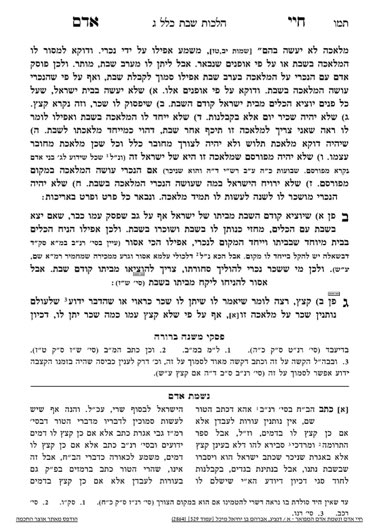We are continuing in siman 3. The Chayei Adam is discussing the second criterion for it to be permitted to make an arrangement with a non-Jew before Shabbos regarding melacha on Shabbos, which is that the non-Jew must be paid. We learned that if the non-Jew offers to perform the work for free, it is muttar, but if the Jew asks him to perform the work for free, it is a problem, because the non-Jew becomes the shliach of the Jew.
We also learned that if the non-Jew could complete the work before Shabbos, the Jew may initiate the arrangement, even if the non-Jew does not end up completing the work before Shabbos begins. Additionally, the Jew may initiate the request earlier in the week, even though it is clear the non-Jew will not finish the work before Shabbos, unless it is obvious that the work is for a Jew.
The Chayei Adam will clarify in the next siman that the non-Jew must be a kablan; meaning, the non-Jew has undertaken the job, and is contracted to perform a specific job. We need to avoid the appearance that the non-Jew is the shliach of the Jew. We assume that he does not appear to be the Jew’s shliach when the arrangement was made earlier in the week, unless it is a melacha which is obviously for a Jew.
In the last line of siman 3, the Chayei Adam writes that a letter which is written in Yiddish or Hebrew, or an address which is clearly the address of a Jew, falls under this last point of something which is obviously for a Jew. We need to clarify the concept of using the postal system. The Chayei Adam will discuss it at length in siman 11, so we will discuss it there.
In siman 4, the Chayei Adam discusses the third criterion of the heter to make an arrangement with a non-Jew for Shabbos. The Chayei Adam writes that the third criterion is that the non-Jew is contracted as a kablan. The Chayei Adam defines a kablan as an arrangement where the non-Jew agrees to perform a specific job, and there is a payment to accomplish the specific job. Meaning, his payment is for the completion of the job rather than for the amount of hours or days worked. Someone paid per hour is known as a sechir yom, and it is assur to create an arrangement as a sechir yom on Shabbos.
The Shulchan Aruch Harav, in siman 244, explains that an arrangement with a kablan is muttar because the primary thrust of the arrangement is the completion of the work, since the kablan does not get paid until he completes the work. Therefore, the job becomes his, and he is working for his own job. This is in contrast to the sechir yom, where the primary thrust is the fact that he gets paid for every hour (or day) he works. He has no interest per se in completing the job, hence the “job” is not his. His focus is to work for the Jew. This makes the sechir yom look like a shliach of the Jew, as opposed to the kablan, whose focus on completing his work makes him more independent.
Summary
- If one instructs a non-Jew before Shabbos, there are times when it will be muttar, depending on eight conditions.
- The second condition is that the non-Jew must be paid fair value for the work he performs. He must feel confident that he will be paid the going rate, either because the Jew verbally informs him, or because it is standard to be paid for such work and there is a clear rate of payment.
- If the non-Jew owes the Jew a debt of gratitude, and volunteers on his own to perform melacha for free, the Jew may accept the offer, because the non-Jew is still working for himself (to pay up his debt of gratitude). However, the Jew may not initiate that the non-Jew work for free.
- If the arrangement took place earlier in the week, or on erev Shabbos but with enough time to complete the melacha before Shabbos, the Jew may initiate that the non-Jew work for free. However, if the item is a clearly Jewish item, it is assur unless there is a necessity.
- One of the applications of this last point will be the postal system, which we will discuss later.
- The third condition is that the non-Jew be employed as a kablan, rather than a sechir yom, so that he is working for himself rather than as a shliach of the Jew.



